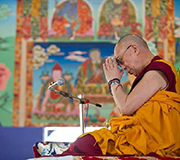Our world is heavily interdependent. New challenges, like the climate crisis that affect us all, as well as our participation in the global economy, mean that we must take the whole of humanity into account. We have to put the global interest first.
We need to take urgent steps to reduce our reliance on fossil fuels and to adopt renewable sources of energy such as those that rely on the wind and the power of the sun. We must pay attention to deforestation and protect the environment better. We have to plant and care for more trees. In my own life I have witnessed the decline in snowfall, first in Tibet and later in Dharamsala. Indeed, some scientists have told me that there is a risk of places like Tibet eventually becoming deserts. That is why I am committed to speaking out for the protection of Tibet’s fragile environment.
Our life is based on hope, a desire for things to turn out well. Hope is concerned with the future. Although nothing about the future can be guaranteed, we remain hopeful, which is much better than being pessimistic. Even as global warming increases in intensity, many young people in particular are working together to find and share solutions. They are our hope.
Nowadays, when we face serious problems as a result of the climate crisis, we have to help each other by setting a timetable for change. As human beings, living on this one planet, we must make an effort to live happily together. The threat of climate change is not limited by national boundaries—it affects us all. We must work to protect nature and the planet, which is our only home.
 On Earth Day 2022, let us remember that everybody wants to live a happy life. Not only human beings, but animals, birds and insects too. All of us should be concerned about our collective existence. As human beings our marvellous brains provide us with remarkable opportunities to do good, but if we look at how the world is today, we should be able to do better. We need a more holistic education, an education that incorporates inner values, such as a compassionate concern for others’ well-being.
On Earth Day 2022, let us remember that everybody wants to live a happy life. Not only human beings, but animals, birds and insects too. All of us should be concerned about our collective existence. As human beings our marvellous brains provide us with remarkable opportunities to do good, but if we look at how the world is today, we should be able to do better. We need a more holistic education, an education that incorporates inner values, such as a compassionate concern for others’ well-being.






















